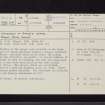Pricing Change
New pricing for orders of material from this site will come into place shortly. Charges for supply of digital images, digitisation on demand, prints and licensing will be altered.
Upcoming Maintenance
Please be advised that this website will undergo scheduled maintenance on the following dates:
Thursday, 9 January: 11:00 AM - 3:00 PM
Thursday, 23 January: 11:00 AM - 3:00 PM
Thursday, 30 January: 11:00 AM - 3:00 PM
During these times, some functionality such as image purchasing may be temporarily unavailable. We apologise for any inconvenience this may cause.
Edinburgh, Burgh Muir, St Roque's Chapel
Burial Ground (Medieval), Chapel (Medieval)
Site Name Edinburgh, Burgh Muir, St Roque's Chapel
Classification Burial Ground (Medieval), Chapel (Medieval)
Alternative Name(s) St Roche's Chapel; Boroughmuir
Canmore ID 52544
Site Number NT27SE 78
NGR NT 2533 7143
NGR Description NT 2533 7143 and NT 2529 7140
Datum OSGB36 - NGR
Permalink http://canmore.org.uk/site/52544
- Council Edinburgh, City Of
- Parish Edinburgh (Edinburgh, City Of)
- Former Region Lothian
- Former District City Of Edinburgh
- Former County Midlothian
NT27SE 78 2533 7143 and 2529 7140.
(NT 2533 7143) Chapel (NR) (Site of), (NT 2529 7140) Grave Yard (NR) (Site of)
OS 25" map, (1908)
Victims of the plague were isolated on the Burgh Muir, and for their spiritual comfort a chapel dedicated to St Roque, otherwise known as St Roche, the patron saint of the afflicted, was built. No record survives of its founder or date of erection, but from its subsequent history it must have been built by the Town Council between 1501-4. The chapel, which was orientated, consisted of a nave and chancel, equal in width. There was a burial ground attached. The structure was derelict in 1789 and finally demolished in 1791.
W M Bryce 1918; RCAHMS 1951.
No trace. No further information.
Visited by OS (J D) 31 December 1953.
INVENTORY OF GRAVEYARD AND CEMETERY SITES IN SCOTLAND REFERENCE:
Address: St Roque's Chapel Burial Ground, Burgh Muir, Edinburgh
Postcode: N/a
Status: No longer extant
Size: N/a
TOIDs:
Number of gravestones: Not known
Earliest gravestone: Not known
Most recent gravestone: Not known
Description: Burial ground associated with a chapel, no longer extant
Data Sources: OS MasterMap checked 20 September 2005
REFERENCE :
The catalogue slip refers to the 'Society of Antiquaries of Scotland' - Sir D Wilson's "Old Edinburgh" Volume II - 1 engraving (18th Century) but this could not be found at the time of upgrade.
Publication Account (1951)
213. Chapel of St. Roque, Burgh Muir.
The chapel of St. Roque, or St. Roche, stood in the S.W. part of the Burgh Muir; its site is now within the grounds of Canaan House, S. of Grange Loan. The earliest reference to it is in 1507, when James IV paid it a visit (1); and it was probably built a few years earlier - perhaps by Richard Hopper, who endowed an altar dedicated in the name of St. Roque in St. Giles' Church in 1502 (2). Grose's illustration (3) indicates that the chapel consisted of a nave and a chancel, equal in width. The former, entered from the S. and lit by a large, arched window in the W. gable, opened into the latter by an obtusely pointed chancel-arch, which was built up at some later period.
St. Roque's has always been termed a chapel, except in a charter of 1532 which requires the chaplain to keep his ‘kirk’ water-tight and to pray for those who ‘lyis in the said kirk and kirkyard’ (4). As, however, it was not actually a church, and as chantry chapels had not the right of sepulture, it is reasonable to infer that St. Roque's primary function was to serve as a hospital chapel, in which capacity it would have been entitled to maintain a grave-yard. On the other hand, as feuing began on the Burgh Muir soon after 1490 (5), St. Roque's may have been a chapel-of-ease for new residents in this neighbourhood and may have received the right of sepulture in virtue of this fact. However this may be, it was the nucleus of the town's first isolation-hospital, as from as early as 1530 persons suffering from the plague were kept there, probably in wooden huts built round about the chapel (6). Plague patients were still there in 1585 (7), but in1645 they were at Sciennes in the N.E. part of the Burgh Muir (8). The structure was derelict in 1789, when Grose's illustration was prepared, and it was finally demolished in 1791.
RCAHMS 1951, notes contributed by C A Malcolm
(1) Accts. L.H.T., iii, p. 293. (2) Reg. Cart. St. Egid., p. 185. (3) The Antiquities of Scotland, i, facing p. 38. (4) B.R., 1528-1557, p. 59. (5) B.R., 1403-1528, p. 58. (6) B.R., 1528-1557, p. 45. (7) B.R., 1573-1589, p. 416. (8) B.R., 1642-1655, pp. 71 f. It is only in this case that wooden huts are mentioned specifically.








